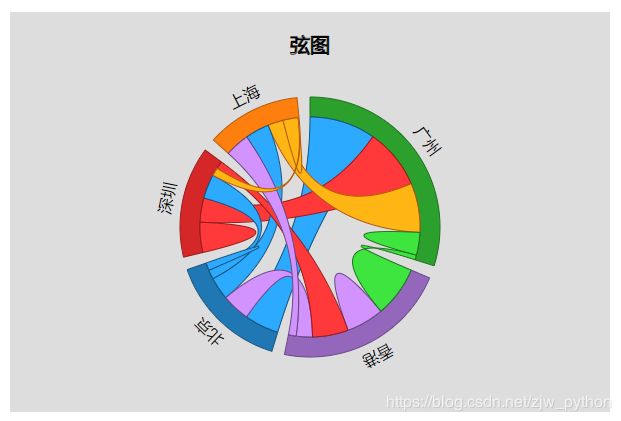D3 二维图表的绘制系列(二十八)关系图-弦图 chord
上一篇: 日历热力图
下一篇: 径向树图
代码结构和初始化画布的Chart对象介绍,请先看 这里
本图完整的源码地址: 这里
1 图表效果
2 数据
{
"citys": ["北京","上海","广州","深圳","香港"],
"population": [
[1000,3015,4567,1234,3714],
[3214,2000,2060,124,3234],
[8761,6545,3000,8045,647],
[3211,1067,3214,4000,1006],
[2146,1034,6745,4764,5000]
]
}
3 关键代码
导入数据
d3.json('./data.json').then(function(data){
.....
一些样式配置,例如内外半径
const config = {
margins: {top: 80, left: 80, bottom: 50, right: 80},
textColor: 'black',
title: '弦图',
hoverColor: 'white',
innerRadius: 110,
outerRadius: 130
}
传入矩阵,进行数据和尺度的转换,调用d3.chord,配置弦图的布局信息,经处理后的数据将被转换为类似于树的节点+边的组合
/* ----------------------------尺度转换------------------------ */
const chord = d3.chord()
.padAngle(0.1)
.sortGroups(d3.descending) // 环状弦排列顺序
.sortSubgroups(d3.descending) // 单个环状弦内部连接弦排列顺序
.sortChords(d3.descending); //连接弦上下层叠顺序
const handleData = chord(data.population);
渲染外环,绑定节点数组,运用d3.arc绘制圆环
/* ----------------------------渲染外环------------------------ */
chart.renderRing = function(){
const arc = d3.arc()
.innerRadius(config.innerRadius)
.outerRadius(config.outerRadius);
const groups = chart.body()
.append('g')
.attr('class', 'chord')
.attr('transform', 'translate(' + chart.getBodyWidth()/2 + ',' + chart.getBodyHeight()/2 + ')')
.append('g')
.attr('class', 'groups')
.selectAll('g')
.data(handleData.groups);
groups.enter()
.append('g')
.attr('class', (d) => d.index + ' g')
.append('path')
.attr('fill', (d) => chart._colors(d.index % 10))
.attr('stroke', (d) => d3.rgb(chart._colors(d.index % 10)).darker())
.attr('d', arc);
}
渲染外环对应的文本标签,计算各文本坐标,然后旋转文本
/* ----------------------------渲染文本标签------------------------ */
chart.renderText = function(){
const radius = config.outerRadius + 10;
d3.selectAll('.g')
.append('text')
.attr('class', (d) => 'label ' + d.index)
.attr('x', (d) => radius * Math.sin((d.endAngle + d.startAngle)/2))
.attr('y', (d) => -radius * Math.cos((d.endAngle + d.startAngle)/2))
.attr('transform', (d) => 'rotate(' + 180 * (d.endAngle + d.startAngle) / 2 / Math.PI + ',' + radius * Math.sin((d.endAngle + d.startAngle)/2) + ',' + -radius * Math.cos((d.endAngle + d.startAngle)/2) + ')')
.attr('text-anchor', 'middle')
.text((d) => data.citys[d.index])
}
渲染连线,调用d3.ribbon直接生成path
/* ----------------------------渲染连线------------------------ */
chart.renderRibbon = function(){
const ribbon = d3.ribbon()
.radius(config.innerRadius);
const ribbons = d3.select('.chord')
.append('g')
.attr('class', 'ribbons')
.selectAll('path')
.data(handleData);
ribbons.enter()
.append('path')
.attr('class', (d) => d.source.index + '-' + d.target.index)
.attr('fill', (d) => d3.rgb(chart._colors(d.target.index % 10)).brighter())
.attr('stroke', (d) => d3.rgb(chart._colors(d.target.index % 10)).darker())
.attr('d', ribbon);
}
最后绑定鼠标交互事件,鼠标悬停在外环或连线时,突出显示
/* ----------------------------绑定鼠标交互事件------------------------ */
chart.addMouseOn = function(){
d3.selectAll('.g')
.on('mouseenter', function(d){
d3.selectAll('.ribbons path')
.filter((link) => link.target.index !== d.index && link.source.index !== d.index)
.classed('show', true);
})
.on('mouseleave', function(){
d3.selectAll('.ribbons path')
.classed('show', false);
});
d3.selectAll('.ribbons path')
.on('mouseenter', function(link){
d3.selectAll('.g')
.filter((d) => link.target.index !== d.index && link.source.index !== d.index)
.selectAll('path')
.classed('show', true);
d3.selectAll('.ribbons path')
.filter((d) => link !== d)
.classed('show', true);
})
.on('mouseleave', function(){
d3.selectAll('.ribbons path')
.classed('show', false);
d3.selectAll('.g path')
.classed('show', false);
});
}
大功告成!!!
![]()
